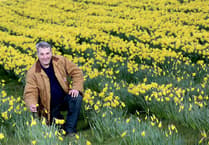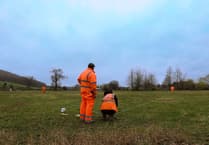The past year has been another 12 months of challenges for the agricultural industry, but as always, we have taken the stumbling blocks into our stride writes Glyn Roberts.
Our year started in a very different way than usual–the long standing farmhouse breakfast week went virtual, as in person events were still not possible due to covid-19 restrictions.
Nonetheless, the team managed to raise thousands for our charity the DPJ Foundation. We are now looking forward to having breakfast either in person or virtually in the New Year, so keep your eyes peeled for information local to you and get in touch with your county office for more details.
Our teams, including staff from FUW Insurance Services Ltd., also joined forces to combat poor mental health as they joined others as part of the #Run1000 challenge to inspire rural communities to take to the countryside to help improve their mental health.
The winner of the challenge to reach the 1000 milestone was Wales and the FUW Ltd. group team contributed a total of 1,156 miles to the overall 64,785 miles recorded across all teams around the world.
From the outset we were engaged in environmental and biodiversity work, urging members to take part in the Game and Wildlife Conservation Trust’s Big Farmland Bird Count and highlighting the good work that is already being done on farms across Wales.
The event was a great success and I hope that many of you will take part again next year. More recently the FUW was proud to host the launch of the Gylfinir Cymru/Curlew Wales Action Plan, aimed at saving a species that members care deeply about.
Against the backdrop of environmental work carried out by our farmers however, was frustration as members directly felt the brunt of not just climate change but inaction by authorities. Members in Meirionnydd for example had several hundred acres of land at Llanfrothen near Porthmadog flooded, as a result of the Afon Croesor overflowing once again to the nearby Internal Drainage District, which is supposed to be managed by Natural Resources Wales–causing tremendous damage to some of the best agricultural land in the area.
Shortly after we were faced with another major problem. Cue the introduction of the Water Resources (Control of Agricultural Pollution) (Wales) Regulations 2021. It can still only be described as a gross betrayal of the industry and one we hope the committee looking into it now will rectify. Indeed, we expressed our bitter disappointment with Senedd Members who failed to support a motion to annul the regulations after the motion was defeated by 30 votes to 27–support that was turned around within weeks following extensive lobbying, when the newly appointed Senedd Members voted unanimously to review the regulations.
Nevertheless, the decision to cut and paste outdated thirty year old EU legislation designed to tackle problems in intensively farmed areas into the Welsh statute books is itself a major concern for all those who understand the purpose of Welsh devolution, and we have not shifted our position on this.
At the beginning of the year and in a show of unity, we joined forces with NFU Cymru and Wales YFC and called upon the Minister, Lesley Griffiths MS, to pause and reconsider what a future policy should deliver for the people of Wales. We also expressed concerns around the future direction of Welsh agricultural policy, following the publication of the Agriculture (Wales) White Paper.
We rejected the key proposals for the future of agricultural support in Wales set out in the White Paper, and called for a genuine Welsh policy to be developed to meet Welsh objectives. Central to the Welsh Government’s proposals would be moves to ratchet up rules and restrictions, and base farm support payments purely on the delivery of environmental benefits such as clean air, water quality, and wildlife habitat. The failure of the Welsh Government’s Agriculture White Paper to refer to payment capping was also shameful and raised major concerns that a regressive move away from the policy is being considered.
In addition to our political engagement, we hosted a series of hustings where farmers could quiz the prospective Welsh Senedd candidates across Wales ahead of the Welsh Senedd elections in May. In line with the Welsh Senedd elections, we outlined the big issues facing agriculture in Wales at a press conference and launched our Welsh Senedd Election manifesto.
In our 2016 election manifesto we warned of the unprecedented challenges facing the incoming Senedd Members and Government, and in the five years since those challenges have not only materialised but been exacerbated and added to.
Welsh farmers are proud to produce world-leading food to environmental, animal health and welfare and food safety standards that are second to none, but these need to be regulated in a proportionate manner which does not stifle innovation, create unjustified restrictions and place Welsh farmers at a severe competitive disadvantage against other countries’ agricultural produce.
Such concerns are particularly pertinent in an era when the UK Government is proactively seeking to sign trade deals with countries with production standards which fall well short of those already required of Welsh food producers.
Alongside other critical issues and priorities outlined by the FUW we urged the Welsh Government and Senedd to develop bespoke, policies that reflect such global realities as well as Welsh economic, social and environmental needs and the seven Welsh Well-being Goals; policies which maintain our already high standards while ensuring Welsh producers are not undermined in ways which lead to greater imports of food from those with far lower standards than our own.
The Union has and will continue to hold the parties to account on their commitments to farming and work closely with the Government to ensure future policies support thriving, sustainable family farms–for the benefit of the rural economy, the environment, food security and our unique rural culture and traditions.
We have made no secret about how we regard the prospect of liberal trade deals with countries such as New Zealand and Australia and have raised these concerns regularly with politicians across Wales, on farms, in virtual meetings and in evidence given in writing and orally to House of Commons and House of Lords Inquiries.
As Y Tir goes to print we await the outcome of the emergency UK-EU talks aimed at overcoming the problems caused by the Northern Ireland Protocol–problems which highlight the dangers of rushing into other international agreements without careful scrutiny–and naturally hope the rhetoric about a UK-EU trade war that will be devastating for tens of thousands of UK businesses, not least Welsh farmers, will not become a reality.
Plenty of concerns were raised when it came to the consultation on transporting and exporting live animals, and the Union was clear that farmers should not be discriminated against by a ban on exports when those in other countries and around the world with which trade is set to be liberalised are free to move animals in ways which fall well below the high standards we have in the UK–something the Union described as utter hypocrisy.
During the year we also joined a roundtable meeting with Secretary of State for Environment, Food and Rural Affairs George Eustice MP, where we stressed the need for clarity on funding for Welsh agriculture. We therefore later in the year welcomed the announcement by Minister for Rural Affairs, North Wales and Trefnydd, Lesley Griffiths, that farmers will continue to receive the Basic Payment Scheme until 2023 and that there will be a two year extension to the Glastir Advanced, Commons and Organic scheme contracts.
Not taking our eyes off the ball when it comes to livestock worrying, we hosted a webinar to address the on-going incidents across Wales. We further heard from the North Wales Police Rural Crime team about the law and what they can do to prosecute those who fail to keep their dogs under control.
A welcome cheer was due shortly after as the announcement by Welsh Government Minister of Environment, Energy and Rural Affairs Lesley Griffiths, signaled that a dedicated all-Wales Rural and Wildlife Crime Coordinator role will be established. The Minister agreed to provide funding for the 12 month pilot role and has written to the all Welsh Chief Constables and Police and Crime Commissioners to encourage the appointment of an all-Wales Rural and Wildlife Crime Coordinator. As we got closer to COP 26 and the United Nations Food System Summit (UNFSS), our campaign ‘Guardians of the Welsh Land’, helped members address misleading claims by various groups about the role livestock farming plays in relation to climate change and the environment. We have consistently recognised the threat represented by climate change and the need to take action. This is clear from a cursory look at our manifestos and policy documents published over the past twenty years.
The rationale behind our ‘Guardians of the Welsh land’ campaign therefore was to address those increasingly misleading claims by the media, politicians and other anti-meat lobby groups about the role livestock farming plays in relation to climate change and pollution. We will also address some myths that exist around poor animal health and welfare standards.
As farmers are the most trusted link in the supply chain, they are best placed to communicate their stories helping to address consumer concerns and influencing political agendas. I therefore thank all those members who have supported our efforts to tell the positive story of farming throughout the year.
Another topic that kept us on toes this year, sadly so, is the ongoing bovine TB crisis. Not a meeting we had on farm went by without a member highlighting the devastating impact on their business and mental health this disease has. We were therefore again frustrated by the statement made by the Minister for Rural Affairs regarding the TB Eradication Programme.
We maintain that a holistic approach to TB is needed in order to stamp out all sources of infection. This latest statement continues to chase the disease whilst stepping down efforts to address a significant contributor to the spread of infection.
An agreement between the Labour party and Plaid Cymru to work cooperatively for the next three years on 46 policies where there is a common interest raises a number of hopes–although I suspect much of the devil will be in the detail. The deal covers a huge array of principles, including local procurement, second homes, tree planting, agricultural pollution, the Welsh language and the Sustainable Farming Scheme. The agreement states that a transition period will be introduced as the system of farm payments is reformed so stability payments will continue to be a feature of the Sustainable Farming Scheme during and beyond this Senedd term. We of course look forward to working with the Welsh Government and politicians from across the political spectrum to ensure the Sustainable Farming Scheme is developed in a way which fully respects the commitment to stability payments. As members might expect, we will be keeping a close eye on the developments in order to seek the best future for our family farms.
On a final note this year, I would like to thank our new Managing Director Guto Bebb, our officials and chairmen of committees and of course our staff across the FUW group for all of their hard work.
I raised a glass to all of you on Christmas Day.




